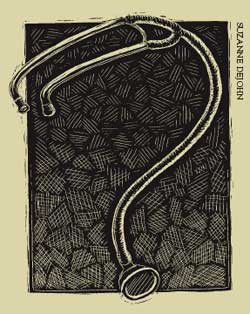Honoring the Past, Shaping the Future
Ms. Smith (a pseudonym) was the first patient I interviewed in the family medicine clinic during my first year of medical school. The primary-care physician who was my preceptor introduced me to the patient and left the room. I started the interview with an open-ended question, as I'd been taught in the On Doctoring course.
"Can you tell me what your concerns are today?" I began. Ms. Smith proceeded to tell me about her insomnia and how it was affecting her work. She confided that she suffered from depression and that it was becoming worse. She added that she was experiencing urinary incontinence after having undergone surgery for vulvar cancer. She said she was sure the cancer had been caused by genital warts that she had contracted during her "wild years."
 Illustration by Suzanne DeJohn A patient who doubts a doctor's integrity may withhold important information for fear it will be misused. |
I was a bit overwhelmed by her story, but after my preceptor returned to the exam room, he and I were able to reassure and comfort her. We changed her antidepressant medications to a regimen that would help her sleep and arranged for her to see a urologist. At the end of the visit, she thanked me for listening to her story.
I've reflected often on that interview with Ms. Smith. She didn't know me and yet, within minutes, she was revealing her deepest secrets and sharing personal information that must have been painful and embarrassing for her to relate. I remember being impressed by the profound trust she had in me. Since then, however, I've come to realize that it was not just me she trusted. It was the profession. I was a member of a trusted group that she believed would keep her secrets, respect and care for her, and help her to become healthier.
Erosion of trust: I wanted to join the medical profession to be able to gain the trust and respect that physicians enjoy. But recently medicine has seen an erosion of that trust. Managed care is partly to blame. As doctors are pressured to see more patients in less time, patients have begun to wonder whether their doctors are putting them or the corporate bottom line first. Without patients' trust, our job of helping them will become much more difficult. A patient who doubts a doctor's integrity may withhold important information for fear it will be misused. Or patients with misgivings may refuse to let a physician examine sensitive areas of their bodies and thus forgo being screened for certain cancers-prostate, breast, rectal, or cervical-that can often be treated successfully if found early.
I wondered what I could do as a student to preserve and extend the trust that the medical profession enjoys. This is not a quest for prestige. I truly believe that patients are better served if they believe their physicians are honorable, altruistic, honest, and knowledgeable.
So, as the president of the DMS Student Government, I pressed my fellow students to think of ways to bolster our profession. We began by changing the academic honor code. Medical schools and medical students are not immune from the national trend of declining academic and personal honesty. Indeed, more than 80 percent of college- bound high school seniors admitted on a confidential survey to cheating in school in the preceding year. In an effort to prevent a cheating scandal here-and thus avoid the negative publicity and accompanying erosion in public trust that would surely follow-DMS students crafted new guidelines for honor and security during medical school tests.
Under the new guidelines, all students are required to sign a statement before each test, reiterating their understanding of the honor code. And the student honor committee now has a more visible presence. The system is now being pilot tested in the second-year courses but is expected to be extended soon to all four years.
Attitudes: In addition, during a fourth-year course called Health, Society, and the Physician, a group of students wrote a "professionalism curriculum"-a description of expected professional behaviors, habits, and attitudes that every medical student should embody. This curriculum not only covers obvious professional behaviors like academic honesty but also explicitly prescribes integrity, saying, "Physicians are expected to uphold a higher moral standard in exchange for the privileges they enjoy. Therefore, you must be moral, truthful, and fair in all aspects of your life. Society also expects physicians to model behaviors such as courtesy, cleanliness, politeness, and generosity."
Some may criticize this document as unnecessary. But it certainly leaves no ambiguity about expectations. True, the medical school admissions process is designed to select honorable, intelligent people as future doctors for the nation. Our professional curriculum merely de- fines the explicit standards of behavior that we feel will help protect the medical profession. The major challenge is to get these ideas across without being pedantic or preachy. More senior students will shoulder this responsibility by addressing the incoming class at orientation, at the first-year class's White Coat Ceremony, and on at least one other occasion before their clinical work starts.
Curriculum: The students' approach in teaching this curriculum is best described as our saying, "This is your profession. Here is what you must do to ensure that it survives."
My hope is that future patients will be able to trust us and other representatives of the medical profession in much the same way as Ms. Smith trusted me early in my medical school career.
If you would like to offer any feedback about this article, we would welcome getting your comments at DartMed@Dartmouth.edu.
